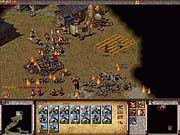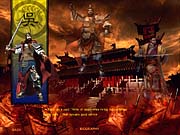Dragon Throne: Battle of Red Cliffs Preview
We take a look at a nearly complete build of this real-time strategy game set in ancient China.
Fans of Fate of the Dragon, the Eidos-published RTS, may do a bit of a double take when they see Dragon Throne: Battle of Red Cliffs. This new RTS by Chinese game studio Object Software is a follow-up to Fate of the Dragon, and graphically, the two games are stunningly similar. However, Dragon Throne promises to offer more refined gameplay than its predecessor, along with more features and more options for building your kingdom over the course of three single-player campaigns. The game offers some unique features, like a "profession transference" system that lets you use workers as soldiers (and vice versa), and the overall look and feel of the game is very slick. The main obstacle that might stand in Dragon Throne's path, however, is the fact that it will probably offer very little that hasn't been done before in many other RTS games.

Dragon Throne is set in ancient China, circa AD 208. Based on the characters and events of the classic 14th-century epic Chinese novel Romance of the Three Kingdoms, the game challenges players to unite the three divided kingdoms of China while playing as one of the three key figures of the time: Liu Bei, Sun Quan, and Cao Cao. The single-player game, in fact, provides three separate campaigns, one for each character. The prerelease version we played included only the Liu Bei campaign, but it was extensive enough to give us a good feel for the styling and overall design of Dragon Throne.
As in most RTS titles, your tasks in Dragon Throne boil down to gathering raw materials (such as wood and corn), refining them into useful items (such as wine and food), building bigger and better facilities within your kingdom, and, of course, stomping your opponents through brutal military conquest. Dragon Throne offers quite a bit more depth than that, of course, but anyone who has logged even a few hours in any other Age of Empires-style RTS will quickly pick up the basics of this game.

The most intriguing element of the entire resource gathering system is that you can send some of your laborers off to the barracks to train as sergeants. This means that they can be sent off to fight wars as trained and effective killing machines and then come home and return to the fields as unskilled laborers once their battles are fought and won. Assuming, of course, that they make it back alive. Even more so, it assumes that you will enjoy periods of relative peace during the game, wherein soldiers can be granted leave to harvest crops (something you don't see much in an RTS game) and not be called upon to defend the realm against attackers. Regardless of the petty details, the profession transference feature is very cool, especially since the trained sergeants are better able to defend themselves if attacked while working as laborers.
The kingdom construction aspect of Dragon Throne is nicely executed. As in most RTS titles, you must build specific buildings to accomplish certain feats or produce certain units. The swordsman's barracks, for example, is required to produce (you guessed it) swordsmen. A single farm, on the other hand, can be called upon to produce both corn and pigs. Basically, you construct the building and then populate it with laborers, who you then designate particular tasks within the context of the building. So you can have two corn farmers in the farm building and two guys tending the pigs.
To keep your laborers productive, you can research new technologies that increase their carrying capacity, their happiness, and their life span. You also have complete control over your empire's tax rate, which governs not only the size of your coffers but also the general happiness of the people under your control. In addition, you will have access to some trade and diplomacy options, which can come in handy when you begin to encounter the other cities and warlords in the surrounding kingdoms.

Movement between cities is handled a bit differently from the movement in most other RTS games, since Dragon Throne uses two miniature maps--one for your city development and resource gathering efforts and another for movement of units across the larger world map. On the world map, when you move units close to a city, you can order them to enter and attack the stronghold, which sends them over to the other minimap. Unlike some other games that use a two-map system, however, like Shogun: Total War, the two maps in Dragon Throne both depict action in real time. This can actually be a bit overwhelming at times, like when you amass a huge army and send it forth to storm an enemy city, only to see that at the same time, opposing armies are storming across the world map toward your main stronghold. Of course, this is the sort of thing that real generals might face in any battle, so who are we to criticize?
One of the game's other intriguing features is the ability to reward specific units with gold and honorary titles. These rewards help to secure the loyalty of your most prized troops. You can also improve the power and effectiveness of your troops by having them learn skills from an assortment of more than 40 in all. These become available as your units gain experience in battle and can allow them to bolster an army's health, gain better attack capabilities, or launch spell-like assaults on specific targets. The reward and skill systems add a slight RPG flair to Dragon Throne, and as your troops become more skilled and experienced, you may find yourself less likely to send them off to combat in meat-grinder, "we can always build more" fashion. Though you don't have any formation commands to organize your troops, you can order them to assume a defensive or aggressive posture and to hold a specific position.

The unit artwork in Dragon Throne is good, though not as visually impressive as the artwork in some of the more recent 3D real-time strategy games. For what it's worth, though, many of the units move and fight in such nicely animated fashion. Likewise, the building artwork is rather striking. Most of the buildings show an impressive attention to detail, and some are quite well animated, but the most notable feature about the buildings in this game is the scale in which they are presented. Even more so than in Age of Empires, the buildings in Dragon Throne are depicted reasonably accurately in relation to the people in the game. So large buildings and objects, like the walls surrounding your city, actually tower over your soldiers' heads.
The audio elements in the game are also quite impressive. The dramatic, classic Chinese musical score is outstanding. The soundtrack features slower, more suitably somber music for basic gameplay but throws in some upbeat tunes for mission summary screens. Regardless of the tempo, however, the music is top-notch in all areas of the game--a real strong point of the title. The sound effects are also worth noting. All the dialogue--and there is a lot of it in this game--is presented in Chinese (don't worry, everything is subtitled). Even the sounds for clicking on and activating certain buildings, like the various types of barracks, seem well done and perfectly suited to the game's style and setting.
Although they were not working in the beta, Dragon Throne's multiplayer modes will support for up to eight players. The game will also include a well-implemented skirmish mode, which was operational in our preview version of the game. You can adjust the number and skill of your opponents and assign the starting tech level, number of starting cities, and a variety of other factors. Aside from the multiplayer features and the two single-player campaigns that were not activated in the beta, we saw few, if any, prerelease glitches in Dragon Throne. Of course, the game was nearly complete when we first got our hands on the preview code, and the final version should in stores any day now.
It remains to be seen whether or not that personality will be enough for the game to survive amongst throngs of Age of Empires look-alikes. However, the game's rich historical setting (and the painstaking detail in which it is presented), the profession transference system, and other slick features may help establish an intriguing personality for Dragon Throne.
Got a news tip or want to contact us directly? Email news@gamespot.com
Join the conversation